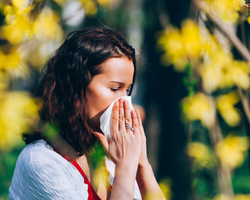
April 28, 2023—Do you sneeze and wheeze or get a runny nose and red, itchy eyes every spring? If so, you might be allergic to pollen in the air.
You might have heard about home remedies for allergy relief. If you're considering trying one, it's important to know the risks and possible benefits before you start. And remember: Let your doctor know about any new treatments you try.
Get the facts
Here's what to know about a few popular home remedies for seasonal allergies.
Honey. Honey contains small amounts of pollen. Some believe that taking it might help a person build up resistance to seasonal allergies. Others think that honey might have some antihistamine or anti-inflammatory effects.
But there is no convincing evidence that ingesting honey eases symptoms caused by seasonal allergies, according to the National Center for Complementary and Integrative Health (NCCIH). And honey might not be safe for everyone. People with pollen allergies may be allergic to bee products, including honey.
Sinus rinses. Sinus rinses, or neti pots, look like teapots. Some people use the devices to flush out their clogged nasal passages with a saline solution (salt water). That can remove dust and pollen.
Neti pots may offer some relief from your allergy symptoms. And you can use them along with other allergy treatments.
But be careful. If you rinse your sinuses with tap water, you could get a serious infection, according to the U.S. Food and Drug Administration. Stick to distilled, sterile or previously boiled water. You can buy distilled and sterile water in stores.
Acupuncture. Practitioners of acupuncture use slender needles to stimulate specific areas of the body. There is some evidence that this therapy might provide some relief for allergies.
Acupuncture is usually considered safe, says the NCCIH. But make sure to choose an experienced practitioner.
Supplements. Researchers have looked at many supplements to see if they might help with allergies. Among them:
- Astragalus.
- Capsaicin.
- Quercetin.
- Grapeseed extract.
- Omega-3 fatty acids.
- Stinging nettle.
Do any of these help ease allergies? Studies have found either limited or inconsistent evidence, the NCCIH reports. Not all supplements are safe for everyone. It's a good idea to check in with your doctor before using them.
Still, if you want to see if capsaicin, for example, might help ease your stuffed-up nose, you don't have to buy a supplement. Instead, you might sprinkle a little cayenne pepper on your meal.
Still sneezing?
Allergies can often be managed by avoiding allergy triggers and taking medications. But if these treatments don't help you enough, let your doctor know. The doctor can suggest treatment options, such as over-the-counter medicines or immunotherapy. You can find other tips for managing spring allergies in our Allergies health topic center.
Sources
- FamilyDoctor.org. "Allergy Shots: Could They Help Your Allergies?" https://familydoctor.org/allergy-shots-could-they-help-your-allergies.
- National Institutes of Health National Center for Complementary and Integrative Health. "6 Things to Know About Complementary Health Approaches for Seasonal Allergy Relief." https://www.nccih.nih.gov/health/tips/things-to-know-about-complementary-health-approaches-for-seasonal-allergy-relief.
- National Institutes of Health National Center for Complementary and Integrative Health. "Acupuncture: What You Need to Know." https://www.nccih.nih.gov/health/acupuncture-what-you-need-to-know.
- National Institutes of Health National Center for Complementary and Integrative Health. "Seasonal Allergies at a Glance." https://www.nccih.nih.gov/health/seasonal-allergies-at-a-glance.
- U.S. Food and Drug Administration. "Is Rinsing Your Sinuses With Neti Pots Safe?" https://www.fda.gov/consumers/consumer-updates/rinsing-your-sinuses-neti-pots-safe.